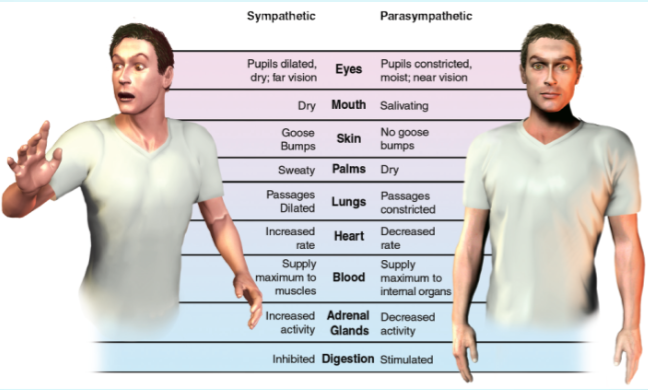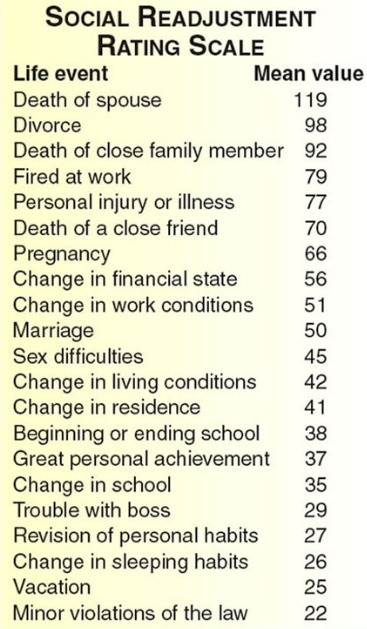
Stress & Effects on the Body
General Adaptation Syndrome (GAS)
General Adaptation Syndrome occurs in 3 stages.
The alarm stage
The resistance stage
The exhaustion stage
The Alarm Stage
The initial reaction to stress | The fight-flight response.
Associated with acute stress.
Scenario:
You see an animal looking angry at you.
You get ready to be attacked.
Your body actively reacts to the emergency (This is the appropriate & healthy response.)
The sympathetic nervous system comes to play.
The Resistance Stage
Associated with chronic stress.
If chronic stress continues for extended periods of time, it will start to take a toll on the body and lead to the development of psychosomatic disorders.
Examples of chronic stress:
Demands of school or job, abusive relationships, being in a war zone, or ongoing racism or discrimination.
The Exhaustion Stage
The result of long-term continuous stress that leads to a breakdown in internal organs and a compromisation of the immune system.
The Workhorses/Backbones of the Stress Response
Adrenaline (epinephrine.)
Glucocorticoids.
A less-known hormone that comes out of the adrenal gland along with adrenaline.
Both adrenaline and glucocorticoids are critical for survival.
Telomerase
An enzyme that can repair damaged chromosomes.
Effects of stress can do some of the following:
Cause weight gain.
Unravel chromosomes.
Kill brain cells.
The Autonomic Nervous System
The sympathetic nervous system (Fight or Flight):
Stimulates adrenals to release hormones, specifically cortisol.
Parasympathetic nervous system (Relaxation):
Reduces activity, conserves and restores energy.

Sympathetic system
Prepares the body for fight or flight
Increases blood pressure & heart rate
Diverts blood to the brain as well as skeletal muscles
Temporarily shuts down/halts the use of unnecessary processes.
Increases both respiration and perspiration.
Releases the stress hormones adrenaline, glucocorticoids, and cortisol.
Realseses glucose
Diolates pupils
trigger urination & defecation
Piloerection: hair stands up.
Parasympathetic system
Reduces activity and conserves as well as restores energy.
Returns the body to normal or homeostasis.
Pupils constrict
Processes that were shut down by the sympathetic system are now back on and in motion.
Psychosomatic Disorders
Physical damage that was brought on either completely or was exacerbated by stress.
Is not imaginary and is very much real.
Caused by chronic stress, anxiety, and worry.
A List of Psychosomatic Disorders
Coronary heart disease: Heart attacks/ strokes.
Allergies and asthma.
Headaches: tension or migraines, as well as backaches.
Stomach problems: Irritable Bowel Syndrome.
Skin disorders: acne, psoriasis.
Ulcers: (Although caused by bacteria, can be exacerbated by stress.)
Increased susceptibility to colds and the flu.
The amount of control we perceive as having, baboons who have more control over their lives do better than baboons with less control; think about it.

Factors in the Causation of Psychosomatic Disorders
The weakest link, Genetic predisposition:
Stress targets particular organs or bodily systems for weakening, and already having a predisposition for the disorder only allows stress to make it worse.
The Type A Personality
Developed by Friedman.
The two main characteristics include the following:
A competitive nature.
Free-floating hostility.
Cortisol as a Stress Hormone
Is the most important Glucocorticoid.
Causing damage due to things like chronic stress, which include:
Decreased hippocampal volume.
Memory issues.
Psychoneuroimmunology
The study of interactions between the nervous system and the immune system.
Chronic stress leads to the suppression of the immune system.
Studies have found that white blood cells decrease with chronic stress.
The polygraph (Lie Detector):
The polygraph does not measure lies but physiological responses, which include the following:
Perspiration.
Respiration.
Heart rate/blood pressure.
The downfall of a polygraph is that there are many factors that can affect physiological responses besides a lie.
Stress & Effects on the Body
General Adaptation Syndrome (GAS)
General Adaptation Syndrome occurs in 3 stages.
The alarm stage
The resistance stage
The exhaustion stage
The Alarm Stage
The initial reaction to stress | The fight-flight response.
Associated with acute stress.
Scenario:
You see an animal looking angry at you.
You get ready to be attacked.
Your body actively reacts to the emergency (This is the appropriate & healthy response.)
The sympathetic nervous system comes to play.
The Resistance Stage
Associated with chronic stress.
If chronic stress continues for extended periods of time, it will start to take a toll on the body and lead to the development of psychosomatic disorders.
Examples of chronic stress:
Demands of school or job, abusive relationships, being in a war zone, or ongoing racism or discrimination.
The Exhaustion Stage
The result of long-term continuous stress that leads to a breakdown in internal organs and a compromisation of the immune system.
The Workhorses/Backbones of the Stress Response
Adrenaline (epinephrine.)
Glucocorticoids.
A less-known hormone that comes out of the adrenal gland along with adrenaline.
Both adrenaline and glucocorticoids are critical for survival.
Telomerase
An enzyme that can repair damaged chromosomes.
Effects of stress can do some of the following:
Cause weight gain.
Unravel chromosomes.
Kill brain cells.
The Autonomic Nervous System
The sympathetic nervous system (Fight or Flight):
Stimulates adrenals to release hormones, specifically cortisol.
Parasympathetic nervous system (Relaxation):
Reduces activity, conserves and restores energy.

Sympathetic system
Prepares the body for fight or flight
Increases blood pressure & heart rate
Diverts blood to the brain as well as skeletal muscles
Temporarily shuts down/halts the use of unnecessary processes.
Increases both respiration and perspiration.
Releases the stress hormones adrenaline, glucocorticoids, and cortisol.
Realseses glucose
Diolates pupils
trigger urination & defecation
Piloerection: hair stands up.
Parasympathetic system
Reduces activity and conserves as well as restores energy.
Returns the body to normal or homeostasis.
Pupils constrict
Processes that were shut down by the sympathetic system are now back on and in motion.
Psychosomatic Disorders
Physical damage that was brought on either completely or was exacerbated by stress.
Is not imaginary and is very much real.
Caused by chronic stress, anxiety, and worry.
A List of Psychosomatic Disorders
Coronary heart disease: Heart attacks/ strokes.
Allergies and asthma.
Headaches: tension or migraines, as well as backaches.
Stomach problems: Irritable Bowel Syndrome.
Skin disorders: acne, psoriasis.
Ulcers: (Although caused by bacteria, can be exacerbated by stress.)
Increased susceptibility to colds and the flu.
The amount of control we perceive as having, baboons who have more control over their lives do better than baboons with less control; think about it.

Factors in the Causation of Psychosomatic Disorders
The weakest link, Genetic predisposition:
Stress targets particular organs or bodily systems for weakening, and already having a predisposition for the disorder only allows stress to make it worse.
The Type A Personality
Developed by Friedman.
The two main characteristics include the following:
A competitive nature.
Free-floating hostility.
Cortisol as a Stress Hormone
Is the most important Glucocorticoid.
Causing damage due to things like chronic stress, which include:
Decreased hippocampal volume.
Memory issues.
Psychoneuroimmunology
The study of interactions between the nervous system and the immune system.
Chronic stress leads to the suppression of the immune system.
Studies have found that white blood cells decrease with chronic stress.
The polygraph (Lie Detector):
The polygraph does not measure lies but physiological responses, which include the following:
Perspiration.
Respiration.
Heart rate/blood pressure.
The downfall of a polygraph is that there are many factors that can affect physiological responses besides a lie.
 Knowt
Knowt
